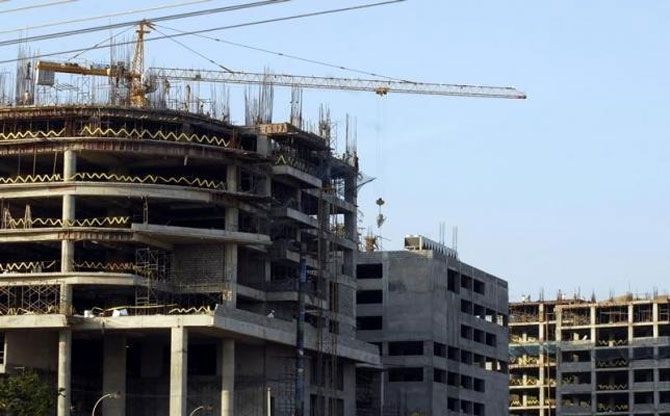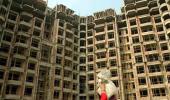 With a multi-year slowdown continuing in 2015 despite abundant supply and fall in prices, the real estate market is desperately looking for a recovery in the New Year when a new law is also expected to herald the much-needed transparency and accountability in the sector.
With a multi-year slowdown continuing in 2015 despite abundant supply and fall in prices, the real estate market is desperately looking for a recovery in the New Year when a new law is also expected to herald the much-needed transparency and accountability in the sector.
Experts said the the housing sales have remained flat this year despite 15-20 per cent fall in prices and multiple interest rate cuts, while a glut continued in the market because of investors still sitting on old inventories.
Property developers and consultants hope that the new real estate law will see the light of day in 2016 and bring in the much-needed efficiency, transparency and accountability into this sector.
The proposed law, which was recently cleared by the Cabinet and would now go to Parliament for approval, can boost customers confidence, which has dented a lot because of delays of up to 5 years in delivery of projects forcing buyers to protest on streets and even go to courts.
Housing sales, which stood at 175,000 units during last year in the primary markets of seven major cities, are likely to be around same level in 2015, property consultant JLL said, adding that sales were marginally down to 116,000 units in the first nine months of this year.
Launches of new homes reduced drastically this year, still over 600,000 housing units remain unsold in eight big cities, according to Knight Frank India.
Developers tried their best to boost sales by offering apartments, on both offline and online platforms, at discount laced with freebies and easier payment plans, but potential buyers chose to wait for further correction in housing prices.
However, realtors are confident of turnaround in 2016, banking on the RBI's move to reduce key interest rate by 125 basis points and the government's steps like easing of foreign direct investment rules and launch of Housing for All and Smart Cities schemes that could provide new growth opportunity for the sector.
"We started this year on a very bad note.
“But the end was much better than the beginning in terms of housing sales.
“Overall, sales remained almost same as 2014," realtors' body Credai president Getamber Anand said.
He said the housing prices have gone down by an average 15-20 per cent in last 18 months. On outlook, Anand said: "There will be a constant steady increase in sales volume and velocity.
“We can hope for very robust 2016".
DLF's CEO Rajeev Talwar said: "With banks passing on the interest rate cuts in the form of reduction in home loan rates, we are already seeing signs of buyers coming back to the sector.
“As the impact of these measures unfolds, we expect buyers to make a comeback to the property market in 2016".
The year 2015 did not bring the hoped-for growth in housing segment but the silver lining is that the bad days seem to have bottomed out, JLL India Chairman and Country Head Anuj Puri said.
Stating that sales have picked up in some cities, he said: "2016 may well bring an end to the long and painful journey this sector has had, and signal an upward growth trajectory".
Unlike housing, the office and retail segments performed better and reported higher leasing numbers against 2014.
With developers facing severe liquidity crunch due to slow sales, there has been sharp jump in private equity investment in the realty sector to over Rs 18,000 crore.
According to property consultant Cushman & Wakefield, the PE investments in real estate was up by 84 per cent to Rs 18,300 crore (Rs 183 billion) in January-September of calendar year 2015, the highest since 2008.
Among the big-ticket deals, DLF sold 50 per cent stake each in two upcoming projects in Delhi for nearly to Rs 2,000 crore (Rs 20 billion) to Singapore's sovereign wealth fund GIC.
It announced sale of its cinema business to PVR for about Rs 500 crore (Rs 5 billion).
Godrej Properties sold 4.35 lakh sq ft of commercial space at Bandra Kurla Complex in Mumbai to healthcare products major Abbott for Rs 1,480 crore, while Piramal Realty raised Rs 2,700 crore (Rs 27 billion) from Warburg Pincus and Goldman Sachs.
Realty portal Housing.com remained in news throughout the year.
After much drama, Housing.com board on July 1 sacked co-founder and then CEO Rahul Yadav, saying that his behaviour towards investors and media was not ‘befitting’ of a chief executive officer.
It appointed Rishabh Gupta was appointed as interim CEO in July.
Last month, Jason Kothari has been appointed as its new chief executive officer.
On legal front, the year 2015 saw realty major DLF getting a major relief after the Securities Appellate Tribunal passed a 'majority order' quashing the three-year market ban imposed on the realty giant by regulator Sebi, even as the Presiding Officer dissented.
However, market regulator Sebi slapped fines totalling Rs 86 crore (Rs 860 million) on DLF, its top executives, their family members and various other related entities for entering into ‘sham transactions’ to mislead Initial Public Offer investors about eight years ago.
Meanwhile, the government rationalised capital gain tax regime for the sponsors of newly-created business structures REITs and INViTs o give a fillip to the investments in realty and infrastructure sectors.
It also exempted the levy of minimum alternate tax on gains and losses arising from exchange of shares with the units of a business trust REIT/InvIT. The liability under MAT would arise only on actual transfer of such units.
Yet, developers did not come forward to launch the REITs to raise funds by listing their rent-yielding commercial assets on stock exchanges.
Through the year, the real estate regulatory bill could not be passed much to the disappointment of consumers.
Realtors kept opposing the bill with demand that the government authorities, which give sanctions for development of the projects, should be brought under the ambit of law.
Last month, the government relaxed the foreign direct investment norms in construction sector by removing two major conditions related to minimum built up area as well as capital requirement.
It also eased rules for foreign investors to exit and repatriate their investments.
Image: A building under construction. Photograph: Reuters
The image is used for representational purpose only











 © 2025
© 2025